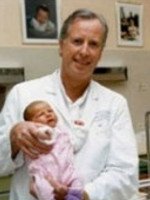All you need to now about Egg Freezing
Women can freeze their eggs to delay pregnancy. This method has so far rarely been used in Germany - doctors see both opportunities and risks.
So far, comparatively a few women in Germany have taken advantage of the possibility of social freezing, also because it is associated with considerable costs.
In social egg freezing, which doctors refer to as cryopreservation, women of childbearing age have egg cells removed during a light anesthesie which are shock-frozen extremely quickly. This prevents forming of ice crystals that could injure the egg cell. According to estimates, about a tenth of the eggs are lost when they freeze. The rest are preserved indefinitely at temperatures around minus 200 degrees Celsius.
If a woman wants to become pregnant and can’t do it naturally, the cells are thawed, artificially fertilized and inserted into the uterus. According to the reproductive doctor Jörg Puchta from Munich, the chances of getting pregnant are similar to those as in normal artificial insemination. However, this also depends on the age of the eggs, the fertility of the partner and the quality of the treatment.
"For a 30-year-old woman, I would assume a pregnancy rate of 50 percent per attempt. If the eggs are older, this is reduced accordingly," says the doctor.
While the method is quite common in the United States, people in Germany are rather reserved. So far there are no comprehensive statistics. However, Dr. Puchta estimates that the number of women who freeze egg cells nationwide is less than 10,000 a year. However, the medical professional is observing an increasing trend. His Munich center currently makes about 500 withdrawals per year. Dr. Puchta reports that 2007 started with around 20 a year.
Getting your oocytes frozen
The “shock freezing” procedure is carried out in the specially equipped lab. Before egg or embryo freezing procedure a patient will be offered to undergo following steps:
- Diagnosing the ovarian function
- Defining the hormone level
- Hormone stimulation
- Mоnitoring of cycle
When the clinical team has decided that your eggs are mature, they will schedule for you the procedure of egg retrieval for further egg freezing. The extraction of eggs lasts about 10 minutes and is performed after ultrasound guidance. The embryologist then searches for vital oocytes in the follicular media and selects the best ones, which have no deviations from the norm. To avoid the forming of ice crystals during the freezing process, the eggs get dehydrated and specially prepared. The selected eggs are properly prepared (washed) in a special tube and then moved to dishes with special culture fluid. The egg freezing process usually begins 60-80 minutes after the egg retrieval. The eggs are introduced in a special freezing straw, with the name of the patient and ID number and then put into a cooling machine, where the temperature of -155 Grad Celsius is maintained. After the process of “shock freezing” (vitrification), the frozen eggs are located into a refrigerator and can be stored there over a long period of time.
How much does it cost to store frozen eggs or embryos?
For pretreatment, removal and storage alone, the estimate costs is about 3,000 to 4,000 euros. Many doctors cooperate with special institutes, so-called cryobanks, which store the frozen egg cells.
This article is going to give only some basic information on cryopreservation of reproductive material (eggs) in Germany. To learn more or to ask questions, concerning the preservation frozen eggs, please call us and schedule the consultation with an experienced fertility specialist.
An interesting fact is that more and more big European companies are going to cover costs for frozen egg storage and thus to allow the talented and promising women to concentrate on their careers. The egg cryopreservation for social reasons (“social freezing”) was initiated by Facebook and Apple in the year 2014. These two companies have agreed to pay each woman employee the whole of $ 20 thousand in order to cover costs for cryopreservation.
The vitrificаtion of eggs, better known as "freezing of eggs", has been developed a decade ago in order to save the fragile reproductive material for future IVF procedures. Preservation of frozen eggs keeps hope for healthy pregnancy alive and is available for women of different age categories. Most frequently the cryopreservation (egg freezing) is performed in next cases:
- woman wants to postpone pregnancy, because of professional reasons
- woman needs preservation of fertility prior to certain treatments, which are supposed to affect fertility
- limited ovarian reserve (limited number of vital eggs) of a woman
- increased risk of early menopause
- autoimmune disease, or chromosomal syndromes in a woman or man
- surgery on fallopian tubes is needed.
The best chances for successful pregnancy after frozen embryo transfer (FET) or frozen egg fertilization have women under the age of 43. The major advantage of cryopreservation of biological material is that a woman can avoid the hormone stimulation of ovaries and egg retrieval every time she decides to try one more IVF or ICSI procedure.
Frozen egg and embryo storage in Germany – be in charge of your own fate!
Successful approaches to egg freezing under strict quality guidelines at German fertility clinics resulted in 500 000 healthy pregnancies of women in reproductive age since 2001. The women who made a decision to store the oocytes (eggs) or embryos in Germany usually say that they feel “more in control of the situation”, since they are “running against the bio clock” and are “free to have as many IVF procedures as needed”. The German Medical Group wants even more women to benefit from egg freezing and sees it as the highest concern to inform female patients about the best options to increase fertility and achieve pregnancy.
Our fertility team will provide you with the detailed information about storage of frozen eggs, clinical experience, pregnancy statistics and prices of infertility treatment. Please, feel free to call us!















 Loading ...
Loading ...


